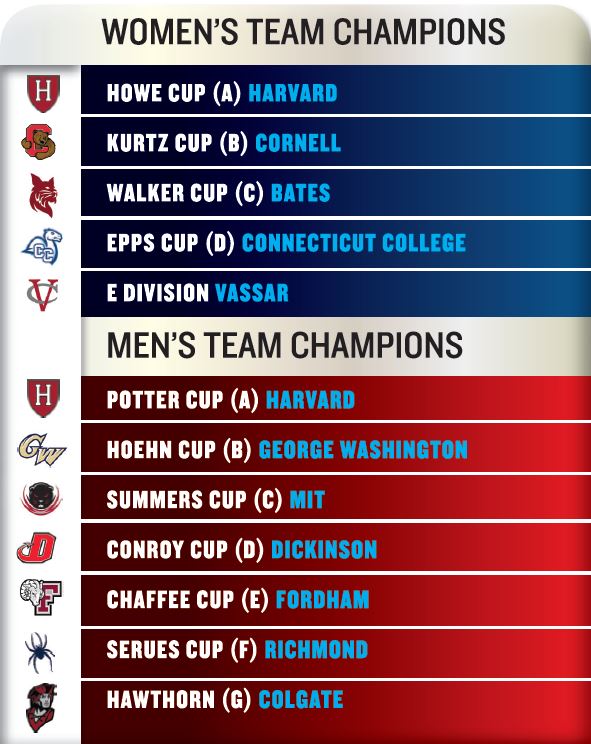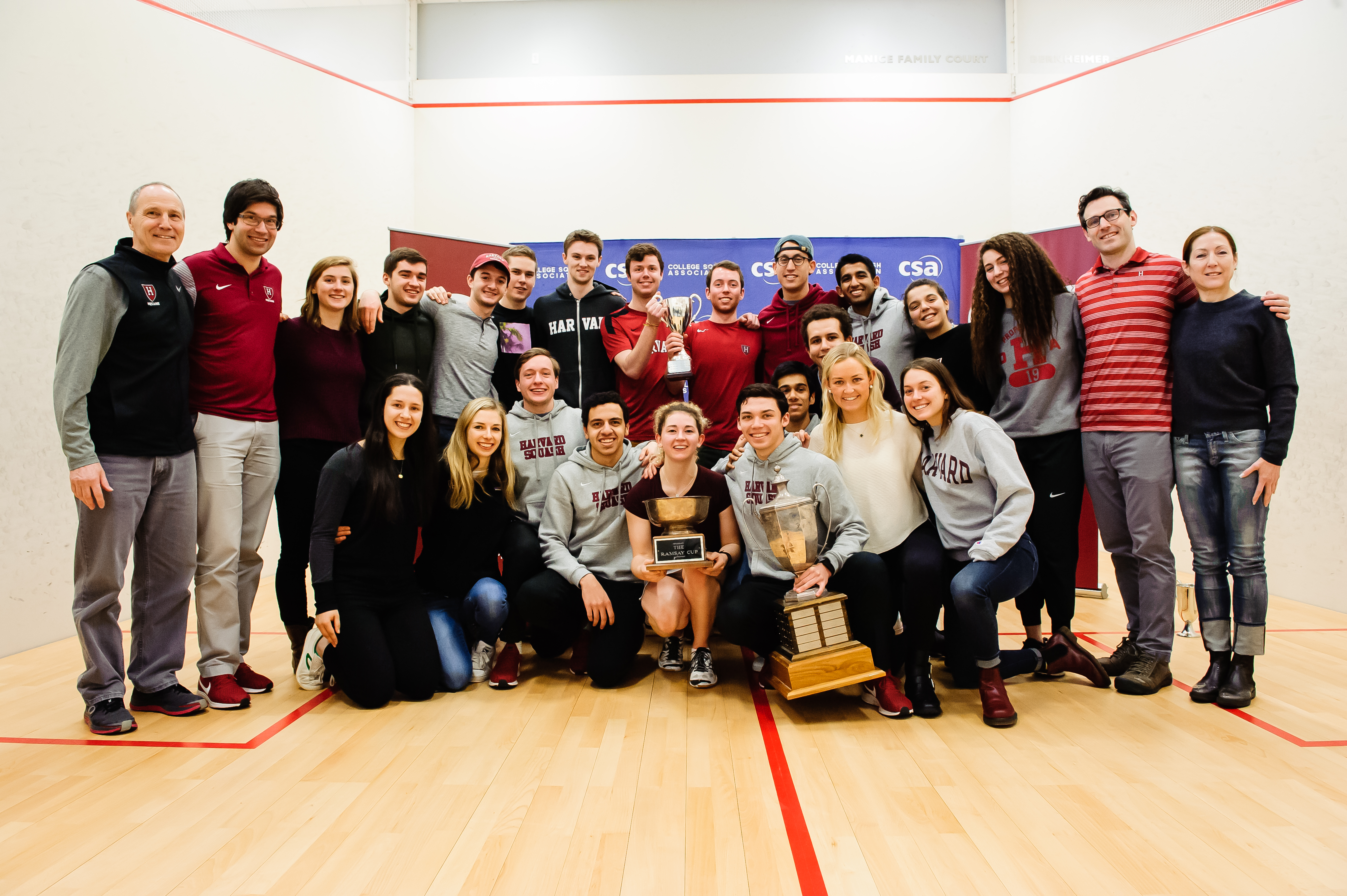by James Zug
Photography by Michael T. Bello/mtbello.com.
For college squash, the twenty teens turned out to be the Decade of Way. Mike Way started coaching at Harvard in August 2010. Since then his squads have captured nine national team titles; the next best mark for the decade is six, by Trinity. His players have won a total of ten national individual titles; the next best mark is two, by a couple of schools.
Right now, the Harvard women’s squash team is on an historic tear. They have won sixty-seven straight dual matches. This season the Crimson passed their previous best win streak—fifty-nine, set in the 1990s, and they now hold the all-time women’s collegiate squash record (Princeton women’s best streak is forty straight matches, from the 1970s and 80s). What is left is the Harvard men’s mark, of eighty-nine matches, also set in the 1990s and then the Trinity men’s record of 252, which looms in the far, far distance, breakable at this rate only in 2032.
The streak started after Sunday 11 January 2015 when Harvard lost to Penn 5-4 in Philadelphia. Three of those wins for Penn came in five-game matches, including the final, clinching match of the day when the Quaker’s Michelle Wong came back from a 2-1 deficit to save match balls in the fourth game against Michelle Gemmell and win 11-6 in the fifth.
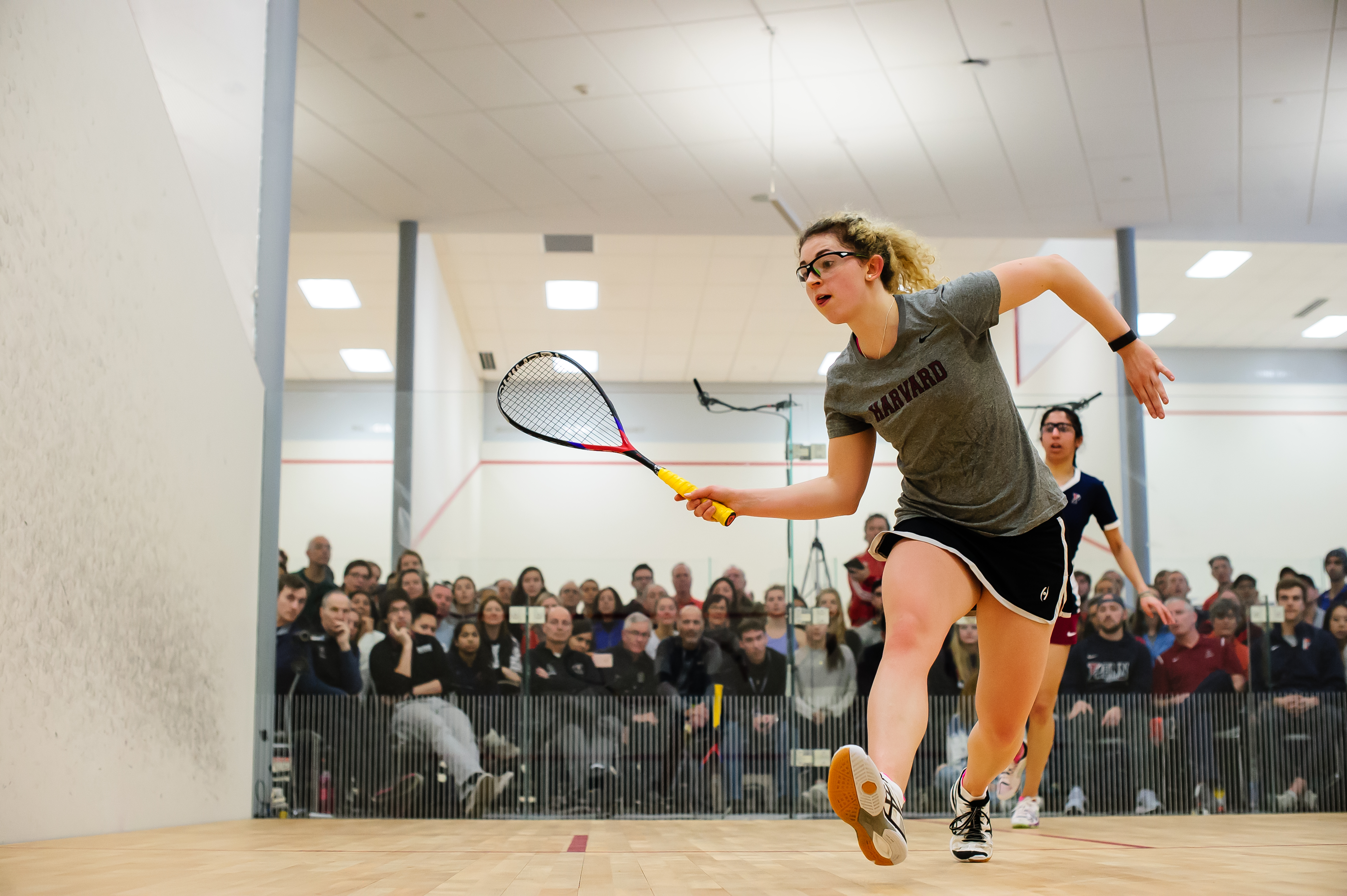
Since that afternoon, Harvard hasn’t lost. They finished that year with a 5-4 victory over Princeton in the semis of the national team championships; in the finals they topped Trinity 7-2, but four of the wins came in four-game matches in which the margin of victory in the fourth game was just two points.
In 2015-16, the team lost fourteen matches, sixty-nine games and 2,555 points, according to Club Locker. Again, at the national championships, the team had back-to-back 5-4 nail-biting wins, topping Penn in the finals (Wong beat Gemmell in four that day).
In 2016-17, they lost a mere seven matches, forty-seven games and 2,609 points. Two wins came over Penn, but both were close—in the first one, three Harvard victories came in five games; in the second Harvard won 7-2 but three Crimson wins ended with a two-point scoreline in their last game, including Harvard’s Kayley Leonard outlasting Marie Stephan 12-10 in the fifth.
In 2017-18, the Crimson cut the game losses to thirty and the match losses to just four—all in 8-1 victories. The team lost just 2,227 points.
This past season was immaculate: they won 117 matches and lost zero—all dual match 9-0 victories. They lost just twenty-one games and reduced the total of points lost to 1,964. Four straight undefeated seasons—the seniors simply never lost a match in their collegiate career.
Not to be outdone, the men’s team went 16-0, losing twelve matches, seventy-six games and 2,979 points on their way to capturing thirty-third national team title.
Thus, this season the program captured what is informally dubbed the Bill Doyle: they won the national teams and individuals and Ivy League titles in both men and women’s collegiate squash. That has happened just twice in U.S. history, in 1994 and 1995, when Harvard was helmed by Doyle. On the weekend that Harvard clinched the Doyle double treble, however, a recent Harvard alum, Ali Farag, won the men’s world championship. If Amanda Sobhy and Farag could do that the same season, bringing in eight titles in all, we’d probably have to call the trophy haul the Mike Way.
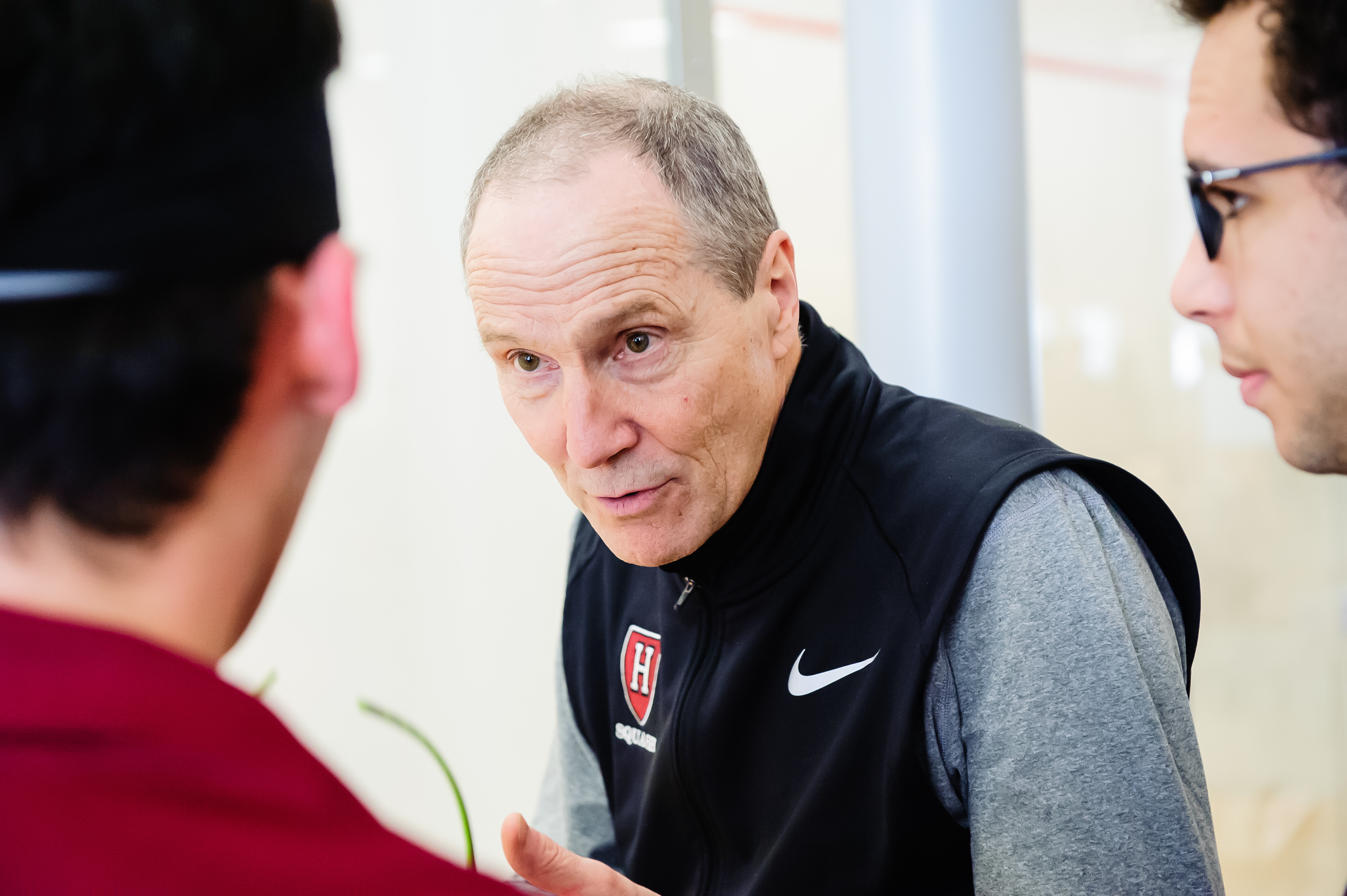
Much like it was with the men’s team at Trinity during their 252-win streak, it hasn’t been a bed of roses along the way. Scorelines of 9-0 don’t reflect the tension. The finals of the 2019 national teams was particularly tight. “This was not a foregone conclusion,” Way said. “The first hour, it was very nerve-wracking.” Harvard lost opening games in two of their matches and in three others the opening game was decided by two points.
Throughout the streak, Way and his assistant coaches have worked on team dynamics. In the beginning, too many players were carrying grudges, grievances, tiny slights. “They’d carry it and be upset and it became a burden,” Way said. “So in September every year, I address the character component. They all laugh. They don’t think there’ll be an issue. But there has been. We’ve had players not talking to other players for years. We don’t tolerate that now. The rule is that it is not allowed to ignore or not greet a teammate—to let it be known by tone, inference and look that you are upset or angry. You have to meet with a captain and the other person and resolve it. They can’t train with the team until the meeting takes place. The issues don’t carry over.”
The non-technical, off-court aspects of squash are, like for most coaches, a central part of Way’s mentoring. He works with the student-athletes on visualizing, scripting, rituals, body language—a full mental program. “When they walk across the bridge [Anderson Memorial Bridge across the Charles River], we want them to say ‘this will now be the best two hours of my day,’” Way said. “Happier kids always play better. We work on team dynamics. We try to make it easier for them to get over obstacles. We do what we can to help these young people feel better. If they are happy, they train harder and play better. The true definition of synergy is when the players on the squad feel good. You run an intelligent program. It makes sense to them. They understand. It is not about recruiting. Work beats talent unless talent works.”
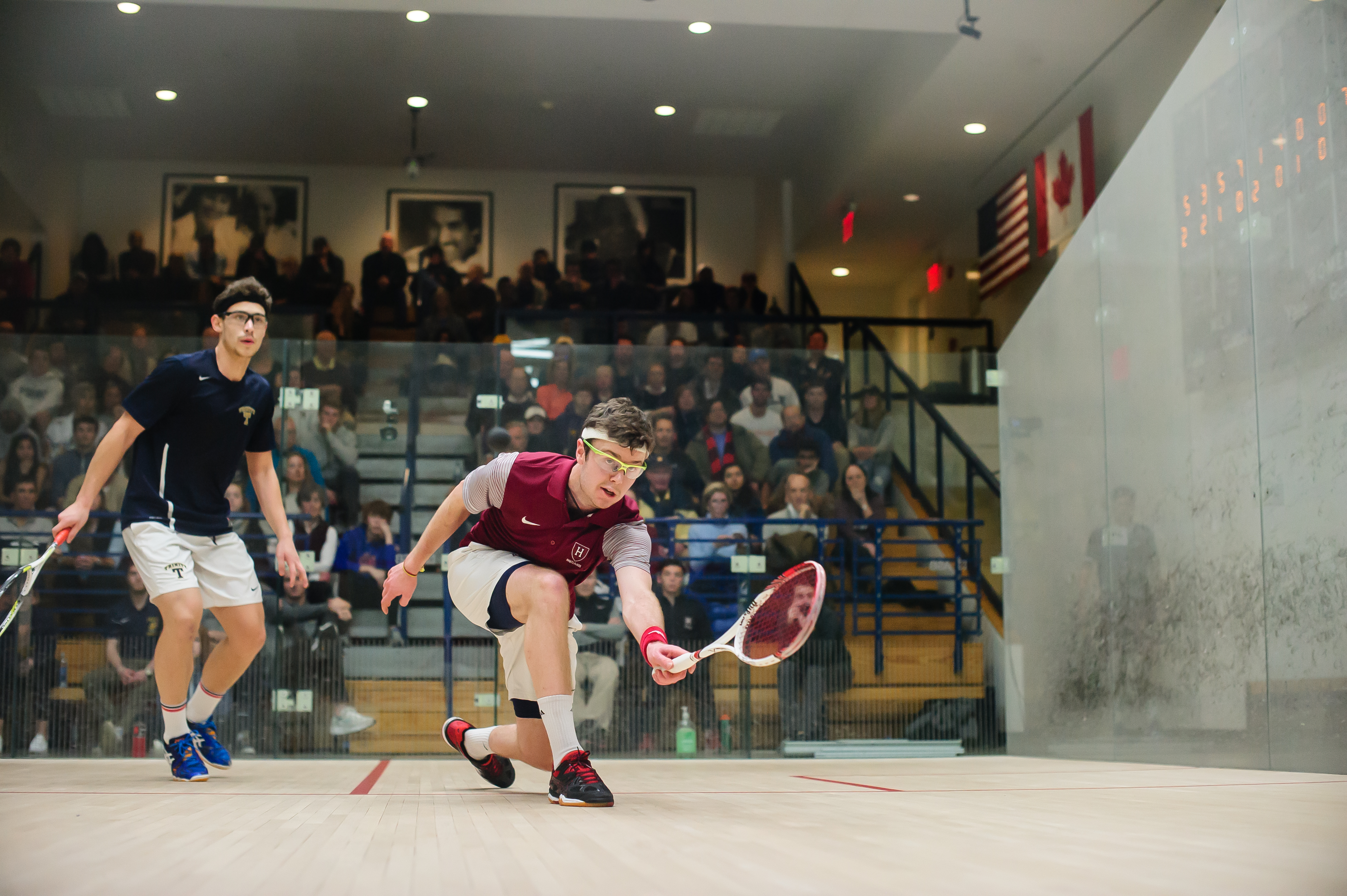
Next year, with the added pressure of a sizable streak, won’t be a foregone conclusion. The women are losing three of their top nine. Three recruits are due to matriculate, including women from Canada and England, and a half dozen of unrecruited women are going to try to walk-on to the squad.
For the Harvard men, they are bringing back their top eight and adding two recruits, both Americans. But parity is a watchword with men’s collegiate squash, with a half a dozen teams legitimately vying for the national title. “Trinity owns the title,” Way said. “Every now and again it gets rented out for a year and then Coach Assaiante calls it back.”
For collegiate squash in general, it was a historic season. Matches were very competitive all the way through. In the Hawthorn (G) division finals at the national teams, for instance, Lehigh and Colgate went down to the wire, with Colgate escaping with a 5-4 victory.
The new CSA board hired its first full-time executive director, David Poolman. He is based at US Squash’s offices in New York. The CSA changed the result of an Ivy League dual match, due to sportsmanship and conduct issues.
“Promoting sportsmanship and fair play is a critical part of the CSA’s mission and one of our top priorities,” Poolman said. “We have created a formal incident reporting mechanism and a robust incident review process. The adjudicated decisions from the first two seasons of the system should give our constituents confidence that the incident reporting system, while still a work in progress, is built to hear their concerns and produce a thoughtful, fair result.”
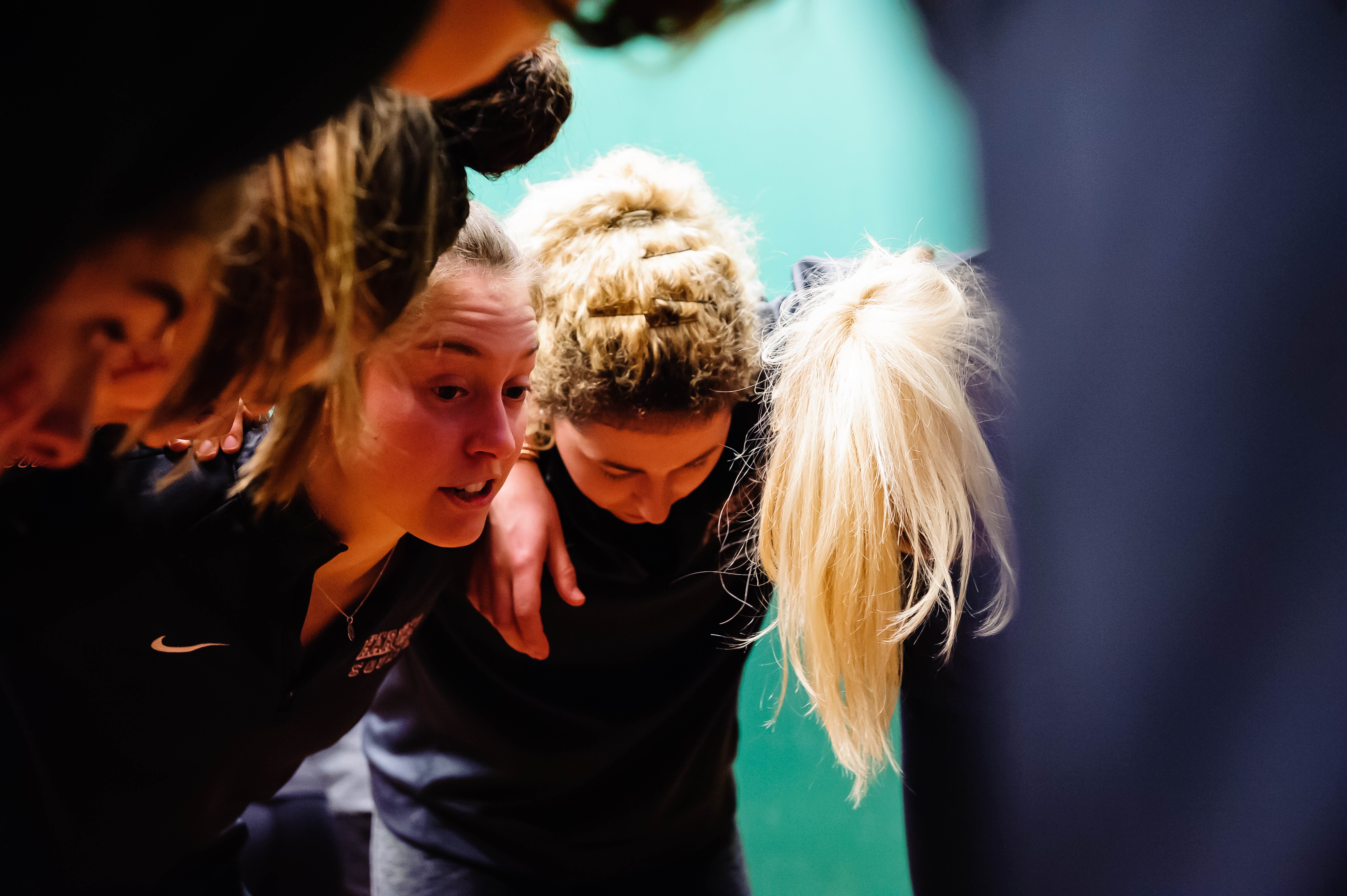
The national team competitions were as vibrant as ever, with 102 teams in attendance (fifty-nine men and forty-three women). Seventy men’s teams and
forty-seven women’s teams earned a national ranking, including squads from Davidson, Vanderbilt, Washington University of St. Louis and Wisconsin. “Growing the number of varsity teams in the CSA is vital to the sustainability of our sport and our organization,” Poolman said. “We are encouraged that the two newest varsity teams—University of Virginia and Chatham University—extend our
geographical footprint into the South and Midwest. It is our goal to continue that sort of growth. CSA board members, coaches and I can vouch for the value that a squash program can bring to a campus community, and we are speaking with institutional decision makers and college squash supporters who would like
to build towards varsity programs.”
A common question for the CSA is about squash formally becoming an NCAA-sanctioned sport. “It has been on my mind since day one,” said Poolman. “The CSA is aware of the legitimacy that move could offer and the growth it could inspire, but we also know that the path to NCAA status is complex and uncertain.
To prepare the foundation of an application to the NCAA, we need to address concerns about recruiting, eligibility and amateurism. That is one of our highest priorities. We feel like the talent level exhibited in college squash is on an upward trajectory. The CSA is seeing parity among teams like never before. We know we have a great product to sell and promote. While we have quite a bit of catching up to do with respect to sharing our student-athlete’s stories and promoting our brand, we are primed to greatly expand our marketing efforts. Partnerships with college squash alumni and fans, parents of current and future players and US Squash will be critical for our success in these areas.”
